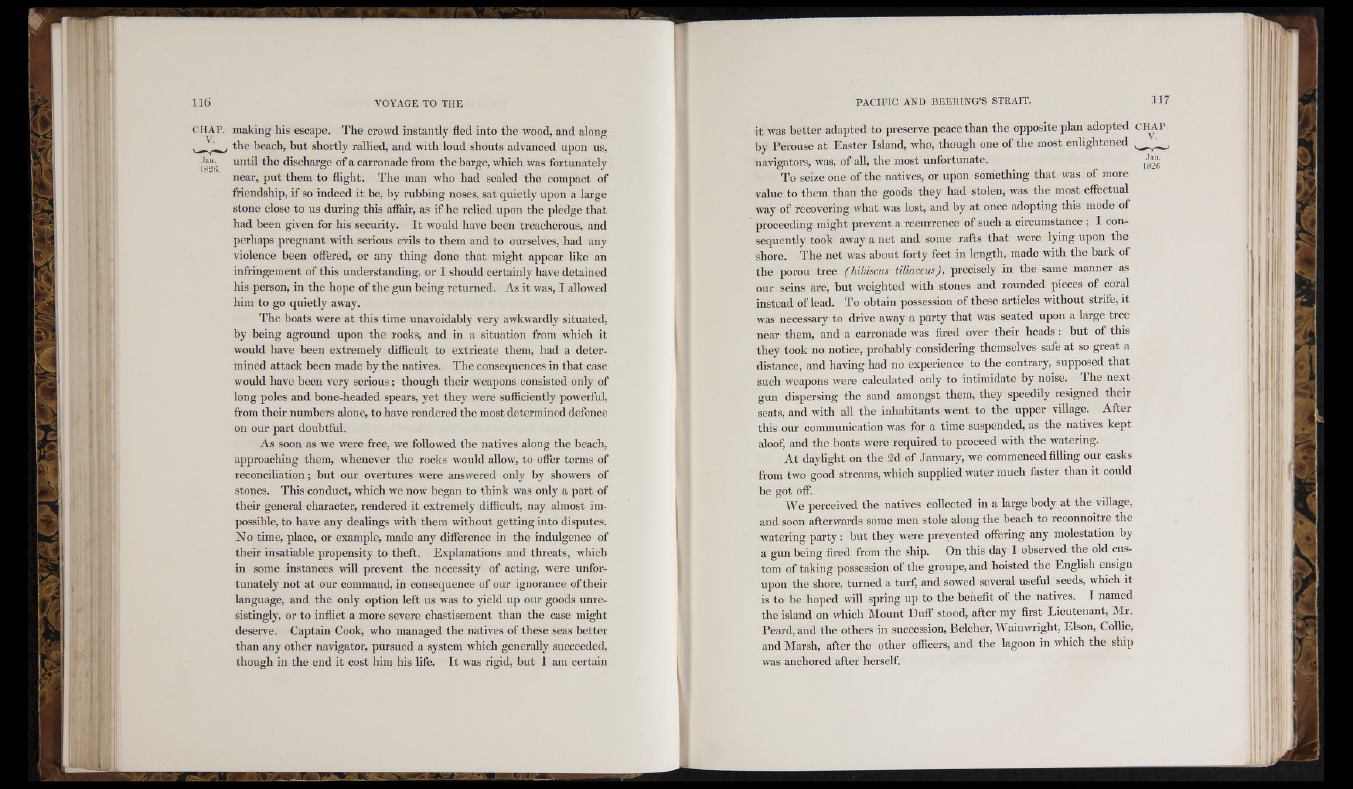
H i
C H A P . making his escape. The crowd instantly fled into the wood, and along
J a n .
1S 2 6 .
, the beach, but shortly rallied, and with loud shouts advanced upon ns,
until the discharge of a carroñado from the barge, which was fortunately
near, put them to flight. The man who h<ad sealed the compact of
friendship, if so indeed it be, by rubbing noses, sat quietly upon a large
stone close to us during this affair, as if he relied upon the pledge that
had been given for his security. It would have been treacherous, and
perhaps pregnant with serious evils to them and to ourselves, had any
violence been offered, or any thing done that might appear like an
infringement of this understanding, or I should certainly have detained
his person, in the hope of the gun being returned. As it was, I allowed
him to go quietly away.
The boats were at this time unavoidably very awkwardly situated,
by being aground upon the rocks, and in a situation from which it
would have been extremely difficult to extricate them, had a determined
attack been made by the natives. The consequences in that case
would have been very serious; though their weapons consisted only of
long poles and bone-headed spears, yet they were sufficiently powerful,
from their numbers alone, to have rendered the most determined defence
on our part doubtful.
As soon as we were free, we followed the natives along the beach,
approaching them, whenever the rocks would allow, to offer terms of
reconciliation; but our overtures were answered only by showers of
stones. This conduct, which we now began to think was only a part of
their general character, rendered it extremely difficult, nay almost impossible,
to have any dealings with them without getting into disputes.
N o time, place, or example, made any difference in the indulgence of
their insatiable propensity to theft. Explanations and threats, which
in some instances will prevent the necessity of acting, were unfortunately
not at our command, in consequence of our ignorance of their
language, and the only option left us was to yield up our goods unresistingly,
or to inflict a more severe chastisement than the case might
deserve. Captain Cook, who managed the natives of these seas better
than any other navigator, pursued a system which generally succeeded,
though in the end it cost him his life. It was rigid, but I am certain
it was better adapted to preserve peace than the opposite plan adopted C H A P
by Perouse at Easter Island, who, though one of the most enlightened
navigators, was, of all, the most unfortunate. |
To seize one of the natives, or upon something that was of more
value to them than the goods they had stolen, was the most effectual
way of recovering what was lost, and by at once adopting this mode of
proceeding might prevent a recurrence of such a circumstance ; I consequently
took away a net and some rafts that were lying upon the
shore. The net was about forty feet in length, made with the bark of
the porou tree (hibiscus tiliaceus), precisely in the same manner as
our seins are, but weighted with stones and rounded pieces of coral
instead of lead. To obtain possession of these articles without strife, it
was necessary to drive away a party that was seated upon a large tree
near them, and a carronade was fired over their heads: but of this
they took no notice, probably considering themselves safe at so great a
distance, and having had no experience to the contrary, supposed that
such weapons were calculated only to intimidate by noise. The next
gun dispersing the sand amongst them, they speedily resigned their
seats, and with all the inhabitants went to the upper village. After
this our communication was for a time suspended, as the natives kept
aloof, and the boats were required to proceed with the watering.
At daylight on the 2d of January, we commenced filling our casks
from two good streams, which supplied water much faster than it could
be got off.
YVe perceived the natives collected in a large body at the village,
and soon afterwards some men stole along the beach to reconnoitre the
watering party; but they were prevented offering any molestation by
a gun being fired from the ship. On this day I observed the old custom
of taking possession of the groupe, and hoisted the English ensign
upon the shore, turned a turf, and sowed several useful seeds, which it
is to be hoped will spring up to the benefit of the natives. I named
the island on which Mount Duff stood, after my first Lieutenant, Mr.
Peard, and the others in succession, Belcher, YVainwright, Elson, Collie,
and Marsh, after the other officers, and the lagoon in which the ship
was anchored after herself.